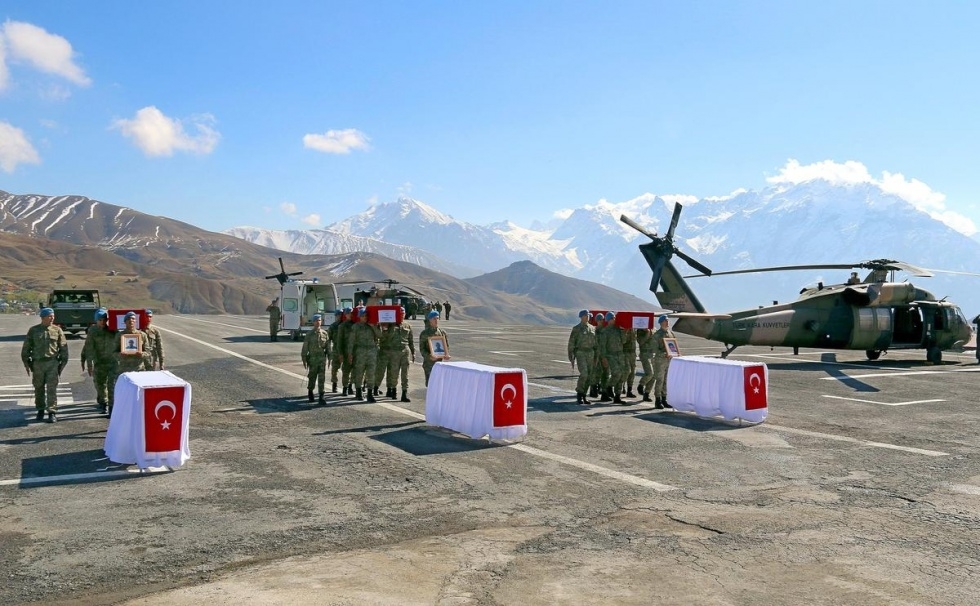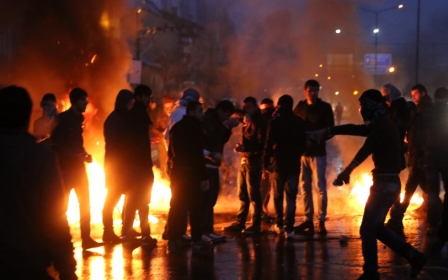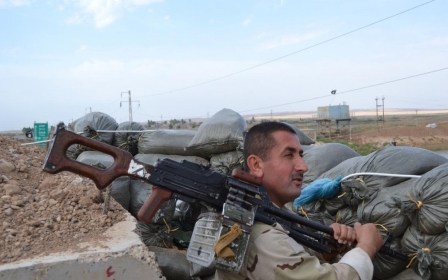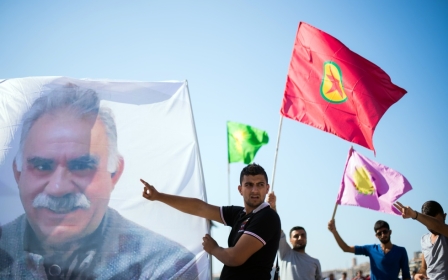Soldiers’ deaths push Turkish-PKK peace to breaking-point

At 4 pm on Saturday in the town of Yüksekova, in the extreme southeast of Turkey, masked gunman shot down three Turkish gendarmerie soldiers in the main street, their bodies left lying in a pool of blood as a crowd looked on.
The soldiers were in plain clothes, apparently having gone out to buy electrical supplies for their police station. Kurdish news agencies quickly reported the killing, alleging that the men were a special operations team. On all sides, the deaths were seen as the work of the PKK (the Kurdish Workers’ Party).
The killing was apparently a reprisal for the deaths a night earlier of three members of the Hêzên Parastina Gel (Peoples Defence Forces), a guerrilla offshoot of the PKK, in the northeastern town of Kağızman.
Government and PKK accounts of the event were at odds. Kurdish sources suggested that the three men had been lured into a trap, while the officials said that they had been caught attacking a hydro-power station.
There was a strong and angry reaction across the country at the killing of the soldiers, with Deputy Prime Minister Bülent Arınç describing them as “brutal”. The immediate question in most people’s minds was whether the country must now brace itself for a new phase of terrorism and counter-strikes, carrying on the 30-year-old campaign between Kurds and the central government which has cost an estimated 40,000 lives.
Since the early-2013 ceasefire and dialogue with the Kurds is recognized as one of the main achievements of the AKP (Justice and Development Party) government, this would be a severe political setback for it.
Prime Minister Ahmet Davutoğlu, who took up his post in August, was swift to try and allay fears that Turkey’s 19-month-old peace process and ceasefire with the PKK is over. “Those who carried out the murders of three of our soldiers in Yüksekova will pay for their crimes . . . the settlement process is not a process of making concessions to attacks of this kind, to savages.
“But we are essentially addressing our people in the region. The people of the region are strongly outraged at this organisation. Our determination about the settlement process continues,” Mr Davutoğlu said.
In trying to prolong the dialogue, however, the prime minister faces two big hurdles. The first is that Turkish public opinion is in no mood to see any apparent concessions being made to the Kurds or to the PKK’s chief, Abdullah Öcalan, who is serving a life sentence for separatism and murder on an island prison in the Sea of Marmara.
Allowing Öcalan to travel along a path parallel to that of Nelson Mandela in his later years on Robin Island, that is, granting him special status and working privileges, is still unthinkable. Last week, it became known that Öcalan, who is now an active player in the politics surrounding the settlement talks, had requested secretarial facilities the better to carry out his work.
The government seems to have considered facilitating this request, but it was forced to back down later, accepting that granting a prisoner a secretariat would be against the law.
“Hawks” and “doves” where Öcalan is concerned are beginning to appear inside the AKP, where, unsurprisingly, he is viewed with distrust. He has received little or no credit for issuing a call that calmed down the violent riots in eastern Anatolia in the second week of this month; indeed, there have even been hints that he should be held responsible for them.
Even more alarmingly, one paper, Bugün, accuses the PKK of actually proclaiming autonomy in the frontier district of Jizre.
With a general election not much more than six months away, the AKP cannot afford to appear soft; equally, it has to try to avoid a slide back into violence and the regular deaths of soldiers. It has unshakable superiority on the ground in the southeast, but this will not win over hearts and minds and stop any violence without an agreement.
This is difficult because, whatever the wishes of and strategy being followed by Öcalan, it is clear that the PKK’s military wing wants confrontation.
PKK fighters operate out of Mount Kandil in the far eastern edge of the Kurdish Regional Government. Their operational chief, Cemil Bayık, a rival of Öcalan’s, made it clear in September that he was breaking the terms of the ceasefire and sending his fighters back into Turkey.
Bayık founded and controls the Hêzên Parastina Gel, the organization whose fighters were killed during Thursday night in Kağızman.
Even before the siege of Kobane and the October riots and deaths in the southeast, the PKK leadership in Kandil felt that the peace process had turned out to be largely without content and that it would never lead to the goals they sought, particularly Kurdish language education and some form of autonomy.
Until the rise of Islamic State, the Kurds also drew from events in Iraq and Syria the message that the tide of history was running firmly in their favour and they had no need to compromise on their demands.
Moreover, some of the PKK are unhappy at seeing cooperation between the PYD (Peoples Democratic Union) defenders in Kobane and the United States, accusing them of “cooperating with imperialism”. The US lists the PKK, but not the PYD, as a terrorist body and gives active support to Turkey against the PKK.
However, the Kurdish movement too has its own “doves”. The HDP, (People’s Democracy Party) is a Kurdish-led political party which tries to follow a middle path in the conflict. In the wake of the killings at Yüksekova, it issued a statement expressing its “sadness and anxiety” at the course of events and expressing condolences to relatives of the dead.
The HDP is still suffering from the consequences of a hasty statement on 6 October, when it called Kurds onto the streets to demonstrate against what it thought was the impending fall of Kobane.
So, with PKK fighters once more deployed in southeastern Turkey and tempers high on both sides, the hawks hold the trump cards. Turkey’s government is counting on weariness among the people of the southeast after three decades of violence to restrain them.
- David Barchard has worked in Turkey as a journalist, consultant, and university teacher. He writes regularly on Turkish society, politics, and history, and is currently finishing a book on the Ottoman Empire in the 19th century.
The views expressed in this article belong to the author and do not necessarily reflect the editorial policy of Middle East Eye.
Photo: Turkish soldiers salute after a military ceremony held for 3 Turkish soldiers martyred on 25 October by members of the PKK in Hakkari, Turkey on Sunday (AA)
Middle East Eye propose une couverture et une analyse indépendantes et incomparables du Moyen-Orient, de l’Afrique du Nord et d’autres régions du monde. Pour en savoir plus sur la reprise de ce contenu et les frais qui s’appliquent, veuillez remplir ce formulaire [en anglais]. Pour en savoir plus sur MEE, cliquez ici [en anglais].





